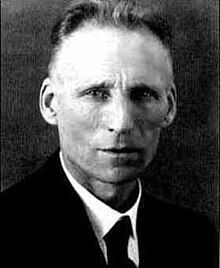LEJ Brouwer
|
L. E. J. Brouwer ForMemRS | |
|---|---|

| |
| Born |
Luitzen Egbertus Jan Brouwer 27 February 1881 Overschie |
| Died |
2 December 1966 (aged 85) Blaricum |
| Nationality | Dutch |
| Alma mater | University of Amsterdam |
| Known for |
Brouwer–Hilbert controversy Phragmen–Brouwer theorem Brouwer fixed-point theorem Proving hairy ball theorem |
| Awards | Foreign Member of the Royal Society |
| Scientific career | |
| Fields | Mathematics |
| Institutions | University of Amsterdam |
| Doctoral advisor | Diederik Korteweg |
| Doctoral students | Arend Heyting |
| Influences |
Immanuel Kant Arthur Schopenhauer |
| Influenced |
Hermann Weyl Michael Dummett Ludwig Wittgenstein |
Luitzen Egbertus Jan Brouwer ForMemRS (/ˈbraʊ.ər/; Dutch: [ˈlœy̯tsə(n) ɛɣˈbɛrtəs jɑn ˈbrʌu̯ər]; 27 February 1881 – 2 December 1966), usually cited as L. E. J. Brouwer but known to his friends as Bertus, was a Dutch mathematician and philosopher, who worked in topology, set theory, measure theory and complex analysis. He was the founder of the mathematical philosophy of intuitionism.
Early in his career, Brouwer proved a number of theorems in the emerging field of topology. The most important were his fixed point theorem, the topological invariance of degree, and the topological invariance of dimension. Among mathematicians generally, the best known is the first one, usually referred to now as the Brouwer Fixed Point Theorem. It is a simple corollary to the second, concerning the topological invariance of degree, which is the best known among algebraic topologists. The third theorem is perhaps the hardest.
Brouwer also proved the simplicial approximation theorem in the foundations of algebraic topology, which justifies the reduction to combinatorial terms, after sufficient subdivision of simplicial complexes, of the treatment of general continuous mappings. In 1912, at age 31, he was elected a member of the Royal Netherlands Academy of Arts and Sciences. He was an Invited Speaker of the ICM in 1908 at Rome and in 1912 at Cambridge, UK.
...
Wikipedia
